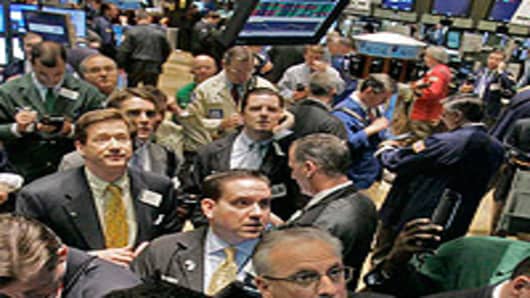A smattering of secondary economic reports and several big retailers' earnings fill what could otherwise be a quiet week, in which markets sort out big moves in interest rates and currencies.
Housing news will be of interest with housing starts, home builders sentiment and a Treasury Department summit Tuesday on the future of housing finance. Retailers Wal-Mart, Home Depot, Lowe's and Target report earnings, as do computer makers Hewlett-Packard and Dell.
As stocks sank in the past week, the dollar shot higher and bond yields continued to wither. The Dow was down 3.3 percent for the week to 10,303, while the S&P 500 lost 3.8 percent to 1079, just above an important support level.
The dollar index had its biggest move in almost two years, gaining 3.2 percent for the week. Against the euro, the dollar gained 4.2 percent to a level of $1.2753, and it was up 1 percent against the yen, after hitting a 15-year low against the currency earlier in the week. The yen was up sharply against the euro and sterling.
The Fed's cautious tone on the economy Tuesday, and its announcement that it would resume quantitative easing helped push buyers into bonds on fears the recovery is faltering. The U.S. 10-year was yielding 2.690 percent, and in a dramatic flattening, the gap between the yields of the 10-year and 2-year reached 2.13 bps Friday, the tightest level of the year. The 2-year was yielding 0.545 percent.
Gold gained nearly a percent on the week to $1214.90 per ounce. Oil was down nearly 7 percent at $75.39 per barrel.
"We're getting into the latter part of August. There's not a lot of news to drive the market next week, but what little news there is is going to have the potential to move a low-volume market. It's a time where you want to be opportunistic, but you have to be aware there's a weak underlying bid for this whole (stock) market," said Leo Grohowski, chief investment officer at BNY Mellon Corp Wealth Management.
"We think actually it's going to be pretty quiet," in the next several weeks, said Robert Sinche, chief strategist at Lily Pond Capital.
"The U.S. data I don't think will be much better or much worse than what we've seen for the month. I know the retail sales (Friday) were a little weaker. The inflation numbers are kind of okay. I don't think we're going to get strong enough evidence in the rest of the month to shift expectations," Sinche said.
Barring any new negative news, he said risk assets, commodities and stocks should stay in a range. "We had a bit of settling back. We find those reasonably valued right now, unless we're going to get a persistent set of bad news on things like Empire Manufacturing or NAHB housing indices—the things at the forefront, like the Philly Fed...Unless we see some movements there, I think we're in the middle of ranges on risk, and that's probably a good center of gravity for the next week or so," he said.
Of the currency moves, he said much of it had to do with movements in U.S. interest rate expectations.
Michael Moran, senior currency strategist at Standard Chartered, said the dollar could continue to rise for now and risk assets may stay troubled. "I think the trade of the last five or six weeks has just been to sell dollars, and I think the market was becoming one-sided, and I think this is an opportune moment to actually balance the books and take some risk off for the time being. A lot of those dollar shorts are being covered right now and I think that means more upside for the dollar," Moran said.
The bond market's focus will also be on the economic reports, particularly housing and even the housing summit, the first step in a process toward housing finance reform (and reform of the government sponsored entities, Fannie Mae and Freddie Mac). The Treasury and mortgage markets have been full of speculation about potential actions, including a massive refinancing of underwater mortgages, which Treasury has denied.
Participating in the summit are representatives of academia, government, banks and think tanks. There will also be representatives of the financial industry including Lewis Ranieri, the father of the MBS market, and Pimco's Bill Gross. Treasury Secretary Tim Geithner and HUD secretary Shaun Donovan are also participating.
Cantor's head Treasury trader Brian Edmonds said the market should continue to shake out from recent big moves. "I think it will be continued volatility in the market. I think that volatility will be at the longer end of the curve. It seems to be more curve volatility than market volatility. The front end doesn't really have anywhere to go,"he said.
The week's housing reports include the National Association of Home Builders sentiment survey on Monday; housing starts Tuesday and mortgage applications Wednesday. Other important data includes the Empire State survey on Monday, industrial production Tuesday, and the Philadelphia Fed survey on Thursday. Leading indicators and weekly jobless claims are Thursday. The Treasury releases its international capital flow data Monday.
Market's Valuation 'By No Means Stretched'
Whither Stocks
The tone in the stock market has become decidedly more negative, now that the earnings season is winding down and economic worries are rising. The Fed's actions in the past week heightened market expectations for a double dip recession, a concern that was fading not too long ago.
Grohowski puts just a 10 percent chance on the possibility of a double dip, but he thinks the market has it priced in at a higher level. He does see a higher level of volatility, but the stock market should grind higher into the end of the year, with the S&P 500 ending at about 1200.
"I think the valuation for the market is by no means stretched," he said. Grohowski said investor sentiment though is poor.
"The skepticism is just palpable, pertaining not only to the market but the economy, and I think a lot of that is emanating from the policy outlook coming from Washington. What I struggle to find is a near-term catalyst for the market, beyond the fact you've got some pretty attractively priced securities out there," he said.
"I think the good news is most of corporate America, unlike 18 months ago, is more likely to hire than fire right now. The bad news is there's a sort of a 'you first' mind set out there, and everybody is being incredibly cautious because they don't have a good handle on the cost of goods sold. We don't know the tax policy. There is a lot of uncertainty around what is going to be the cost of health care...there's just an abnormal level of uncertainty," he said.
The bond market is expressing that uncertainty and fear of a double dip. "The bond market and stock market participants are seeing different things..our view is that gradually we see rates backing up. I would be a buyer of equities before I'd be a buyer of Treasurys because I think over the next 12 to 18 months, we're more likely to see 3.5 to 4 percent 10-year yields, rather than 2 percent. Also in our view I think that's a back up in yield that the equity market can certainly withstand,
"If you're buying that 10-year Treasury on the belief that deflation and a double dip is a greater probability than the 10 percent we do, a lot of investors are going to be unpleasantly surprised," he said.
Corporate bonds would also be preferable to Treasurys. "We would prefer corporates and even tiptoe into high yield at spreads of 700 bps or 800 over Treasurys. We prefer spread products but selectivity is more important than ever," he said. Municipals are also attractive but he said investors must be careful to do the homework on the quality of individual bonds since many more could be downgraded.
As yields slid in the past week, corporations continued to rush to issue new debt at record low rates. The high-yield market in fact had its highest week on record for new issuance, with 26 offerings totaling $14.3 billion.
Earnings Central
Companies reporting earnings Monday include Lowe's , Sysco, Agilent, and Urban Outfitters. Home Depot and Wal-mart report Tuesday, as does Abercrombie and Fitch and TSX.
Wednesday's reports include Target , BJ's Wholesale, Applied Materials, Limited Brands, NetApp, Petsmart and Deere.
Hewlett-Packard and Dell report after the bell on Thursday. Other companies reporting that day include Dick's Sporting Goods, Staples, Ross Stores, Aeropostale, Gap Intuit, Marvell Tech and Salesforce.com.
Hormel and J.M. Smucker report Friday.
Questions? Comments? Email us at marketinsider@cnbc.com
Follow me on Twitter @pattidomm.




